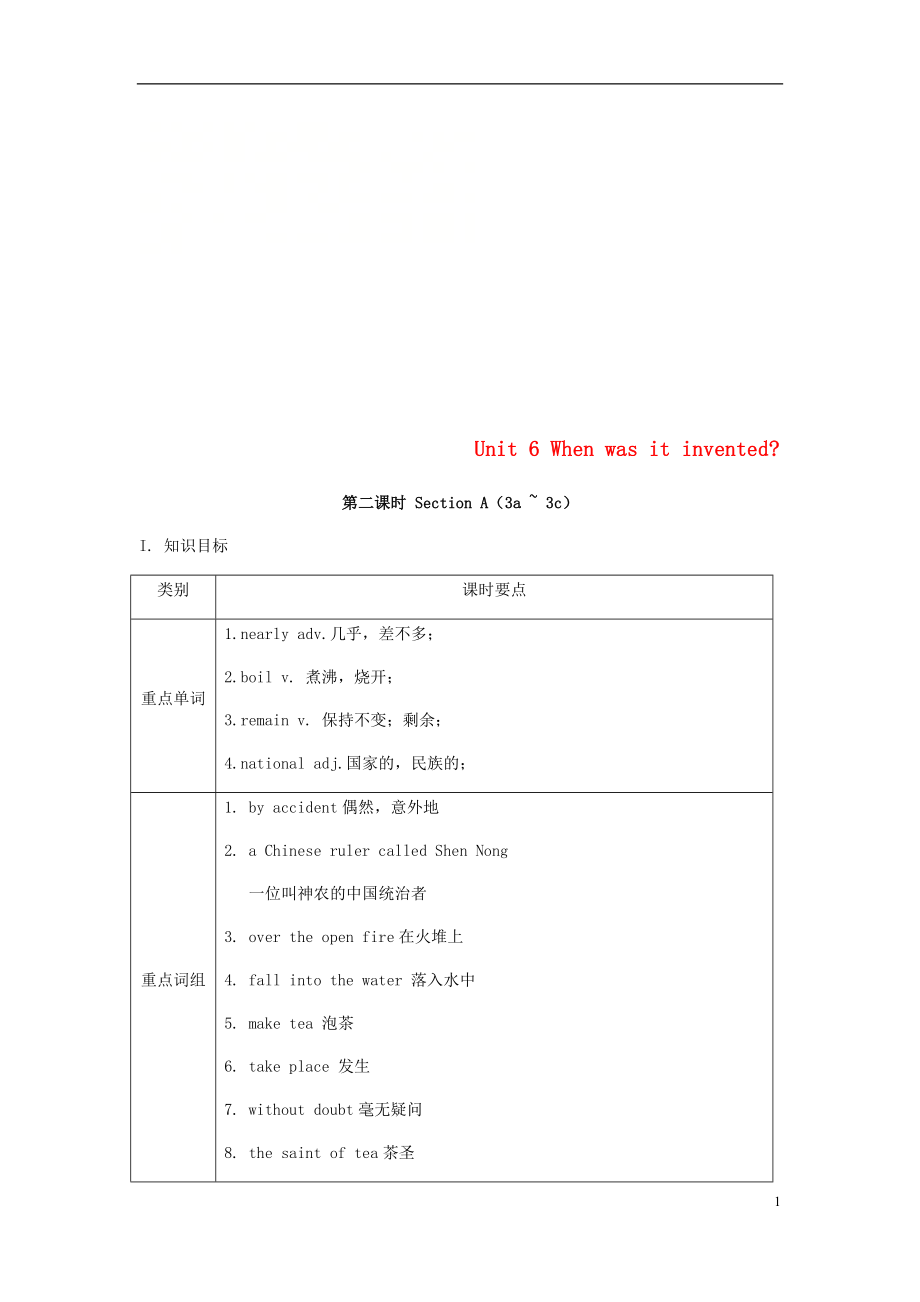《九年級(jí)英語全冊(cè) Unit 6 When was it invented(第2課時(shí))Section A(3a-3c)教案 (新版)人教新目標(biāo)版》由會(huì)員分享���,可在線閱讀�,更多相關(guān)《九年級(jí)英語全冊(cè) Unit 6 When was it invented(第2課時(shí))Section A(3a-3c)教案 (新版)人教新目標(biāo)版(6頁珍藏版)》請(qǐng)?jiān)谘b配圖網(wǎng)上搜索����。
1、
Unit 6 When was it invented?
第二課時(shí) Section A(3a ~ 3c)
I. 知識(shí)目標(biāo)
類別
課時(shí)要點(diǎn)
重點(diǎn)單詞
1.nearly adv.幾乎�,差不多;
2.boil v. 煮沸,燒開��;
3.remain v. 保持不變�;剩余����;
4.national adj.國(guó)家的,民族的�;
重點(diǎn)詞組
1. by accident偶然,意外地
2. a Chinese ruler called Shen Nong
一位叫神農(nóng)的中國(guó)統(tǒng)治者
3. over the open fire在火堆上
4. fall into the water
2�、落入水中
5. make tea 泡茶
6. take place 發(fā)生
7. without doubt毫無疑問
8. the saint of tea茶圣
重點(diǎn)句式
1. The most popular drink in the world was invented by accident?
世界上最受歡迎的飲料是被偶然發(fā)明的。
2. Many people believe that tea was first drunk by Shen Nong nearly 5.000 years ago . 許多人相信茶是在將近五千年前由神農(nóng)首先喝的���。
3. A ni
3����、ce smell was produced when the tea leaves dropped into the hot water.
當(dāng)茶葉落入熱水中時(shí)發(fā)出一種很香的味道�。
4. It also discusses where the finest tea leaves were produced and what kinds of water were used.
它也討論了什么地方出產(chǎn)最好的茶葉并且用什么樣的水。
5. It is believed that tea was brought to Korea and Japan during the 6th and 7th c
4����、enturies.
已確信茶是在六到七世紀(jì)期間被帶到韓國(guó)和日本的。
II. 課堂環(huán)節(jié)
§自主學(xué)習(xí)方案
【新詞自查】
根據(jù)漢語提示完成單詞�����。
1. The tiger is looked as the ruler(統(tǒng)治者)of this forest.
2. Most students went to the playground. Only a few remained (剩下)to clean the classroom.
3. Alice is without doubt (懷疑) the best student in our class.
4. The dragon
5、 is treat as a national (民族的)symbol of the Chinese.
5. Mother is boiling (煮沸) the milk for the baby.
§課堂導(dǎo)學(xué)方案
Step 1情景導(dǎo)入(參考案例)
本課時(shí)的主要內(nèi)容是一篇小短文�����,在學(xué)習(xí)短文之前教師可準(zhǔn)備幾個(gè)與短文內(nèi)容相關(guān)的問題����,然后邀請(qǐng)幾位同學(xué)就提出的問題給出自己的答案或見解。(4分鐘)
Questions:
1. Do you drink tea every day?
__________________________________________
2. Who inv
6�、ented tea in history?
__________________________________________
3. Do people in other countries drink tea in their daily life?
__________________________________________
環(huán)節(jié)說明:通過帶著問題去學(xué)習(xí)短文�,從而達(dá)到導(dǎo)入新課的目的,同時(shí)也可以使學(xué)生積極閱讀短文��,以了解更多的關(guān)于茶的知識(shí)���。
Step 2完成教材3a 的任務(wù)
1. 要求學(xué)生快速默讀短文�,熟知大意��,并完成課本3a的任務(wù):match each paragra
7��、ph with its main idea; 然后邀請(qǐng)幾位同學(xué)給出自己的答案����,全班一起學(xué)習(xí)討論����。(3分鐘)
2. 先邀請(qǐng)幾位同學(xué)閱讀短文(可一人一段)���,教師要注意學(xué)生的語音,給予必要的朗讀指導(dǎo)��。然后播放錄音�,全班同學(xué)一起跟讀。(3分鐘)
3. 短文內(nèi)容鞏固練習(xí)���。教師可給出一篇改寫了的短文����,將一些重點(diǎn)的表達(dá)方式空出��。讓學(xué)生在規(guī)定的時(shí)間內(nèi)補(bǔ)全短文����。然后邀請(qǐng)若干同學(xué)給出自己的答案。(4分鐘)
Tea is the most popular drink in the world. But to our surprise, it was invented by accident. It wasn
8�、't brought to western world until 1610, but it was discovered 3,000 years earlier. An ancient Chinese legend says Shen Nong discovered the tea when he was boiling drinking water in the open air. Some leaves from a nearby bush fell into the water and remained there for some time. And a pleasant smell
9、 came from the water then. He tasted the mixture and it was wonderful. And in this way, tea was invented.
4. 完成教材3b的任務(wù),要求學(xué)生再次閱讀短文內(nèi)容��,回答3b中所提出的問題(5分鐘)
5. 用3c方框中所給的單詞的正確形式完成句子�����;設(shè)置一個(gè)5分鐘的時(shí)限�;然后請(qǐng)5位同學(xué)分別朗讀句子,同時(shí)核對(duì)答案�。
1. invented 2. drunk 3. produced 4. brought 5. traded
環(huán)節(jié)說明:將聽、說�����、讀��、寫的任務(wù)結(jié)合起來不僅鍛煉了學(xué)生的語言綜合運(yùn)用能
10�、力,還鞏固了學(xué)生對(duì)目標(biāo)語言的學(xué)習(xí)����、識(shí)記和運(yùn)用。
§當(dāng)堂評(píng)價(jià)方案(詳見當(dāng)堂訓(xùn)練部分)
§備課資料包
a. 詞匯包:
1.remain (v.) 保持���;剩余�;殘余
remain意為“停留,留下”�,相當(dāng)于stay?�!按粼谀抢铩笨梢哉fremain / stay there����,但“呆在家里”只能說stay (at) home。
【備課例句】
She remains in the house all these days. 她這些天一直呆在那棟房子里����。
They all wished us to remain. 他們都希望我們留下來����。
【橫向輻射】remain作連系動(dòng)詞
remain用
11、作連系動(dòng)詞�,意為“保持(某種狀態(tài)),繼續(xù)存在����,仍舊是”,后面接形容詞�,名詞,分詞�,不定式或介詞短語�。
【例句】
She remained sitting when they came in.他們進(jìn)來時(shí)�,她仍然坐著(沒有站起來)。
Peter became a manager but John remained a worker. 彼得當(dāng)上了經(jīng)理,但約翰仍然是一個(gè)工人�。
Whatever great progress you have made, you should remain modest. 無論你取得了多么大的進(jìn)步,你都應(yīng)一直保持謙虛。
This remains to be
12����、proved. 這有待證實(shí)。(將來被動(dòng)動(dòng)作)
Whether it will do us good remains to be seen. 這是否對(duì)我們有好處,還要看一看����。
【課堂變式】
The leaves ____in the water for a long time.
A. came B. remained C. lived D. arrived
【解析】根據(jù)for a long time可知是指樹葉在水中停留了很長(zhǎng)時(shí)間,正確答案是B�����。
2. by accident偶然地��;意外地
【備課例句】
He made this mistake by accide
13����、nt.他犯這個(gè)錯(cuò)誤純屬偶然。
【課堂變式】
She found her keys _____when she cleaned her room after she lost them two weeks ago.
A. with mistake B. in this way
C. by accident D. with pleasure
【解析】由when she cleaned her room after she lost them two weeks ago可知她是偶然地找到了她丟失的鑰匙�����,正確答案是C。
b. 句式包:
1. In England, tea d
14����、idn’t appear until around 1660.在英國(guó),茶直到1660年才出現(xiàn)��。
此句是由until引導(dǎo)的時(shí)間狀語從句��。not.. until 意為“只到…才…”��。
【備課例句】
She didn’t leave until I felt better.只到我感覺好點(diǎn)了�,她才離開。
?【橫向輻射】until的用法
until常用作介詞或連詞�,用來引導(dǎo)介詞短語或從句在句子中作時(shí)間狀語。
1. 在肯定句中����,until與延續(xù)性����、持續(xù)性動(dòng)詞連用,表示“直到……為止”�。
I worked until late in the afternoon. 我一直干到下午很晚的時(shí)候。
15�����、2. 在否定句中,until常與瞬間動(dòng)詞����、短暫性動(dòng)詞連用,表示“直到……才……”��,“不到……不……”�。
The rain didn’t stop until midnight. 雨直到半夜才停。
I won’t leave until you promise to help me. 你不答應(yīng)幫助我�����,我不會(huì)離開�����。
【課堂變式】
—How was your climbing Mount. Huang?
—I didn’t believe I could do it ______I got to the top.
A. until while C. after D. and
【解析】考查連詞用法�����。not…until…直到……才……�����。根據(jù)句意“直到我爬到山頂我才相信我能做到”可知選A。
6
 九年級(jí)英語全冊(cè) Unit 6 When was it invented(第2課時(shí))Section A(3a-3c)教案 (新版)人教新目標(biāo)版
九年級(jí)英語全冊(cè) Unit 6 When was it invented(第2課時(shí))Section A(3a-3c)教案 (新版)人教新目標(biāo)版

